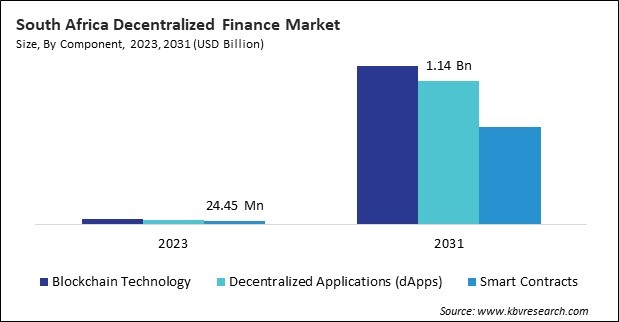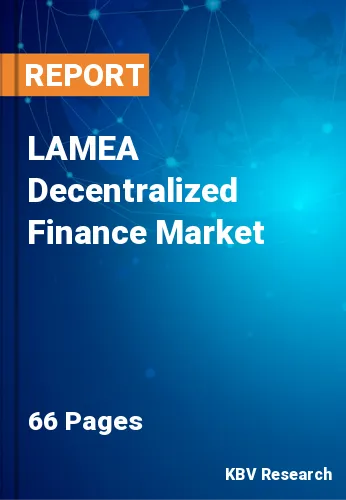The Latin America, Middle East and Africa Decentralized Finance Market would witness market growth of 52.3% CAGR during the forecast period (2024-2031).
The Brazil market dominated the LAMEA Decentralized Finance Market by Country in 2023, and would continue to be a dominant market till 2031; thereby, achieving a market value of $6,467.4 million by 2031. The Argentina market is showcasing a CAGR of 54.4% during (2024 - 2031). Additionally, The UAE market would register a CAGR of 51.2% during (2024 - 2031).

Institutional interest in DeFi has surged, driven by venture capital (VC) investments and strategic partnerships with traditional financial institutions. Leading investment firms like Andreessen Horowitz (a16z), Sequoia Capital, and Polychain Capital have poured billions into DeFi projects, fueling innovation and liquidity. Simultaneously, major banks like JPMorgan and Goldman Sachs are actively exploring DeFi integrations, with JPMorgan executing its first DeFi transaction on the Polygon blockchain and Goldman Sachs launching crypto trading desks.
Moreover, institutional lending platforms like Maple Finance provide regulated environments for corporate borrowers, while BlackRock’s partnership with Circle (USDC issuer) and Fidelity’s crypto trading offerings signal the mainstream acceptance of blockchain-based asset management and stablecoin-backed investments.
The LAMEA region is witnessing an unprecedented surge in DeFi adoption, driven by economic challenges, technological advancements, and the need for greater financial inclusion. In Brazil, the increasing distrust in traditional banking systems and a rising interest in crypto-based financial solutions drive DeFi adoption. With high banking fees and bureaucratic hurdles, many Brazilians turn to decentralized platforms for lending, borrowing, and digital asset trading. The country has a vibrant blockchain developer community, leading to the creation of homegrown DeFi projects that cater to local needs. The advent of remittance solutions utilizing stablecoins significantly improves cross-border payment systems, presenting a credible alternative to conventional banking infrastructures.
Free Valuable Insights: The Worldwide Decentralized Finance Market is Projected to reach USD 351.75 Billion by 2031, at a CAGR of 48.9%
Based on Component, the market is segmented into Blockchain Technology, Decentralized Applications (dApps), and Smart Contracts. Based on Application, the market is segmented into Data & Analytics, Decentralized Exchange, Payments, Stablecoins, Marketplaces & Liquidity, Compliance & Identity, Prediction Industry, Assets Tokenization, and Other Application. Based on countries, the market is segmented into Brazil, Argentina, UAE, Saudi Arabia, South Africa, Nigeria, and Rest of LAMEA.
By Component
By Application
By Country
Our team of dedicated experts can provide you with attractive expansion opportunities for your business.

